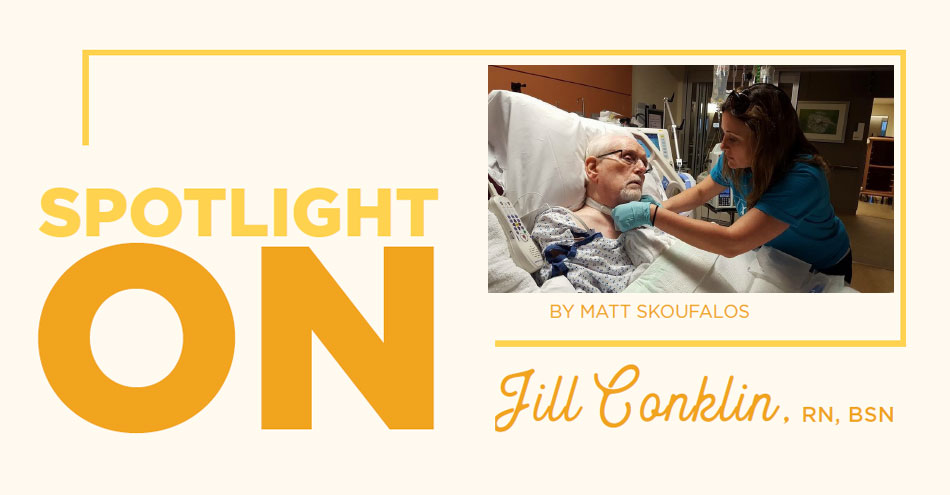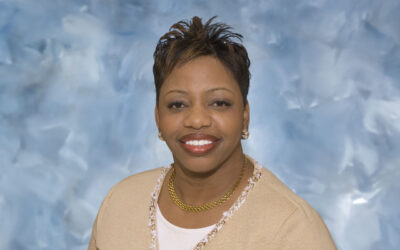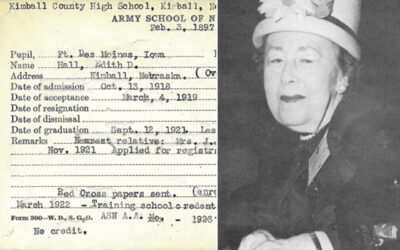By Matt Skoufalos
 Nursing is a career of tremendous diversity, both in terms of the specializations it offers and the people who choose them. For Jill Conklin of Pennsauken, New Jersey, it wasn’t her occupation, but it has become the one most resonant with her life experience.
Nursing is a career of tremendous diversity, both in terms of the specializations it offers and the people who choose them. For Jill Conklin of Pennsauken, New Jersey, it wasn’t her occupation, but it has become the one most resonant with her life experience.
After college, Conklin entered the nonprofit fundraising world. But when her father developed a degenerative illness that left him requiring 24-hour in-home care, she quickly became proficient in all the medical technology and protocols that supported him.
“Just learning the whole picture of a critical care patient happened long before I got into nursing,” Conklin said. Within a few years, she realized that helping to care for her father had unlocked something within her.
“I thoroughly enjoyed taking care of my dad, and decided it wasn’t just because it was my dad,” Conklin said. “I wanted to learn more of the medical field, and decided to put myself through nursing school.”
In 2012, she joined a 15-month accelerated nursing program at Rutgers University-Camden, and fully embraced the pace of her practical education. While rotating through teaching hospitals on both sides of the Delaware River, she eventually landed at Cooper University Hospital in Camden, New Jersey.
Along the way, Conklin honed her understanding of medically complicated patients that had been informed by the experiences of caring for her father. In her final semester of nursing school, however, she found herself pressed to demonstrate that knowledge on the spot.
Conklin chose the cardiac ICU for her last rotation assignment because it wasn’t an area of strength, and she wanted to become more familiar with the work. One night, her preceptor brought her into the room to help revive a patient who was deeply ill. It was effectively a crash course in cardiac care.
“You learn from being thrown in,” Conklin said.
And then, exactly seven days later, when her father’s respirator malfunctioned at home, Conklin calmly sprang into action.
“If it hadn’t been for that room I was in, I wouldn’t have known to kick myself into gear,” she remembers. “I was able to bring him back.”
The experience so stuck with her that Conklin decided to transfer to the cardiac care unit at Cooper after spending the early years of her career in a step-down unit.
“It’s a neat thing to be on that unit now,” she said. “I wanted to get to that spot again; I needed some time to understand what the profession really is.”
Conklin doesn’t discount the time she spent in critical care, either. With 90 percent of her patients in that unit being post-surgical, she learned to manage the needs of multiple vulnerable patients simultaneously.
“It can be a little hectic for the nurse that doesn’t really have a grasp on what they’re doing,” Conklin said. “The patients were just that much sicker.”
Although she came to nursing as a second career, Conklin appreciates the myriad opportunities it offers for her future. When she wanted to work more hours, she added a per-diem position at a nearby hospital. Were she to start a family, she could switch assignments to find a more compatible schedule. And were she to pursue an advanced degree, working at a teaching hospital affords her the chance to do so affordably.
“A nurse should never get bored in her profession,” Conklin said. “The second you get bored, you should start looking for a different avenue.”
“I can work as much or as little as I want,” she said. “You can be exposed to more or to less; [you can] pick your specialty and stick with it.”

Nursing is also the field in which she could synthesize those diverse experiences into her horizon goal, which is a broader, more adventurous assignment — flight nursing.
“I have shadowed quite a few flight nurses on a few 12-hour shifts, and it is probably one of the coolest rushes you could ever have,” Conklin said. “That’s next on the to-do list.”
Among the “whole heckuva lot of certifications you have to obtain to get there” are reasonably lengthy turns in cardiac and intensive care, which only means the years she spent in previous assignments haven’t been wasted.
“I’m in the right position right now to start that journey,” Conklin said. “It’s just a matter of putting the time in and seeing where it leads.”
If bedside care becomes too physically demanding, Conklin also knows she can push into a master’s in nursing administration; her background in finance would certainly accommodate such a transition, and colleagues have already told her as much. For the time being, she is happy to leverage her personal and professional perspectives on patient care in her current role. Conklin believes that both are necessary to do her job well.
“I know how it feels to be on both sides of the coin,” Conklin said. “I understand what it feels like to be that family member and hear an alarm go off and have no idea what it means. I understand how it feels to be a family member who knows quite a bit about how to care for someone and having a nurse who doesn’t respect that.”
“I’ve been through it,” she said; “I was there for 14 years. I have that experience. I can take that and just run with it.”
Or, in a few more years, fly with it.









